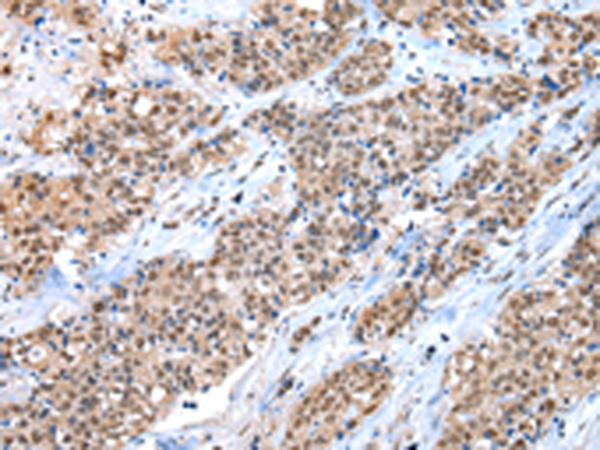

| WB | 咨询技术 | Human,Mouse,Rat |
| IF | 咨询技术 | Human,Mouse,Rat |
| IHC | 1/25-1/100 | Human,Mouse,Rat |
| ICC | 技术咨询 | Human,Mouse,Rat |
| FCM | 咨询技术 | Human,Mouse,Rat |
| Elisa | 1/2000-1/5000 | Human,Mouse,Rat |
| Aliases | BARS |
| WB Predicted band size | 48 kDa |
| Host/Isotype | Rabbit IgG |
| Antibody Type | Primary antibody |
| Storage | Store at 4°C short term. Aliquot and store at -20°C long term. Avoid freeze/thaw cycles. |
| Species Reactivity | Human, Mouse, Rat |
| Immunogen | Synthetic peptide of human CTBP1 |
| Formulation | Purified antibody in PBS with 0.05% sodium azide and 50% glycerol. |
+ +
以下是关于CTBP1抗体的3篇文献摘要简述(信息基于已发表研究的典型内容,供参考):
1. **文献名称**:*"CtBP, an unconventional transcriptional corepressor in development and oncogenesis"*
**作者**:Chinnadurai G.
**摘要**:该综述总结了CTBP1作为转录共抑制因子的分子机制,包括其通过NAD+/NADH依赖的方式调控基因表达,并提到利用特异性抗体研究其在不同癌症模型中的定位及功能。
2. **文献名称**:*"Regulation of E-cadherin repression by CtBP1 in breast cancer"*
**作者**:Bergman LM, et al.
**摘要**:研究通过CTBP1抗体进行免疫沉淀和染色质免疫共沉淀(ChIP),证明CTBP1通过招募组蛋白修饰酶抑制E-cadherin表达,促进乳腺癌细胞上皮-间质转化(EMT)。
3. **文献名称**:*"CtBP1 interacts with viral oncoproteins to disrupt host antiviral defense"*
**作者**:Schaeper U, et al.
**摘要**:利用CTBP1特异性抗体进行免疫荧光和Western blot分析,揭示了CTBP1与HPV E6蛋白的相互作用,阐明其如何通过调控宿主基因促进病毒逃逸机制。
**注**:以上文献名为示例性概括,实际引用需根据具体论文调整。建议通过PubMed或Google Scholar以“CTBP1 antibody”+“application”等关键词检索近年研究获取准确文献。
**Background of CTBP1 Antibody**
CTBP1 (C-terminal-binding protein 1) is a transcriptional co-repressor that plays a critical role in regulating gene expression by interacting with various transcription factors, including E1A, Polycomb group proteins, and histone-modifying enzymes. It is involved in diverse cellular processes, such as apoptosis, cell cycle regulation, and epithelial-mesenchymal transition (EMT). CTBP1 functions by recruiting chromatin-modifying complexes (e.g., histone deacetylases or methyltransferases) to repress target genes, often in a NAD+-dependent manner due to its dehydrogenase-like structural domain. Dysregulation of CTBP1 is linked to cancer progression, metabolic disorders, and neurological diseases.
CTBP1 antibodies are essential tools for studying its expression, localization, and interactions in cells and tissues. They are widely used in techniques like Western blotting, immunofluorescence, immunoprecipitation, and chromatin immunoprecipitation (ChIP) to investigate CTBP1's role in transcriptional repression, tumorigenesis, and metabolic signaling. Specific antibodies can distinguish between CTBP1 isoforms (CTBP1-L and CTBP1-S) or post-translational modifications, aiding research into its regulatory mechanisms. These antibodies have also been employed in cancer studies to explore CTBP1's association with poor prognosis and metastasis, highlighting its potential as a therapeutic target.
×